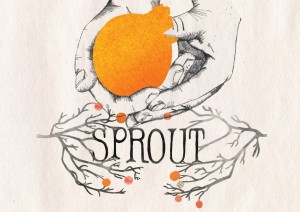SPROUT | PEDRO COLLECTIVE & TAMARAMA ROCK SURFERS
- November 20th, 2011
- Posted in Uncategorized
- Write comment

Jessica Bellamy is one of my favourite playwrights.
As a person she is fabulously floppy haired and hilarious, articulate and joyful.
As a playwright she is eloquent, creative, sassy (I think she’d like the fact I’d use that word to describe her work), poetic and incredibly hard working. She had two good years with Brand Spanking New (“Living Breathing Loving” and “King of the Mountain”, before heading to NIDA to flourish under Jane Bodie’s incisive eye – and despite having jaunts of work produced at ATYP, Sprout is her first substantial post-NIDA offering, independently produced at The Old Fitzroy Hotel.
There’s a rustic feel to the world of Bellamy’s play – wooden beams in state of being built – or perhaps in a state of collapse hard to tell – but there is one thing for certain – this is a world which is dry and desperate. Erosion is everywhere and in everything – there are dust showers that choke and smudge, plants are rarities due to the sun’s blast – and people live mainly at night due to the harshness of the environment. Despite all this, somethings still grow – love, resentment, fear, hope – human things still grow, develop and die.
In this world, language is truncated and words crisply crack and stab – with the exception of the dulcet tones of a warm languid voice of a weatherman on the radio. A woman ( Ashley Ricardo) is pregnant – and holds with in her the too much adored child of her husband (Fayssal Bazzi), who fails to see her as anything more than the carrying case of their child. Meanwhile her sister (Matilda Ridgeway), girlishly barren, co-parents a toad with a stranger, Tom (Sam O’Sullivan).
It’s a bleak and harsh world, where the importance of words is vital in the holding onto memory. Memory of sounds or birds and things long extinct – natural things, nature. And the play reflects a genuine concern for the environment, and serves not only as a cautionary tale about the erosion of soil highlighting the importance of conservation, but as a cautionary tale about the breakdown of language (and communication) as the cause of disconnected relationship.
Gin Savage’s production allows Bellamy’s words the freedom to have their own identity and it is simply supported by the design work of Owen Phillips, Sara Swerzsky and Tom Hogan.
At times the text is very dense, fortunately the actors keep a good handle on the emotional world of the play, and we are happy to travel along with it.
There is something not quite resolved in the story itself, and I’m not sure what the future holds for any of the characters – I’m not sure if they are satisfied or if they have achieved what they want or need. I’m not sure much is resolved beyond a stunning portrait of a place and a circumstance, but it by no means diminishes the ideas of the play. But then again, I’m not sure that the audience being satisfied is really an aim of this play… perhaps there are just questions raised.
But I do have a feeling there is more to come – from Sprout, from the Pedro Collective and from Jessica Bellamy – and I’ll be ready to continue to watch this play and these artists grow.